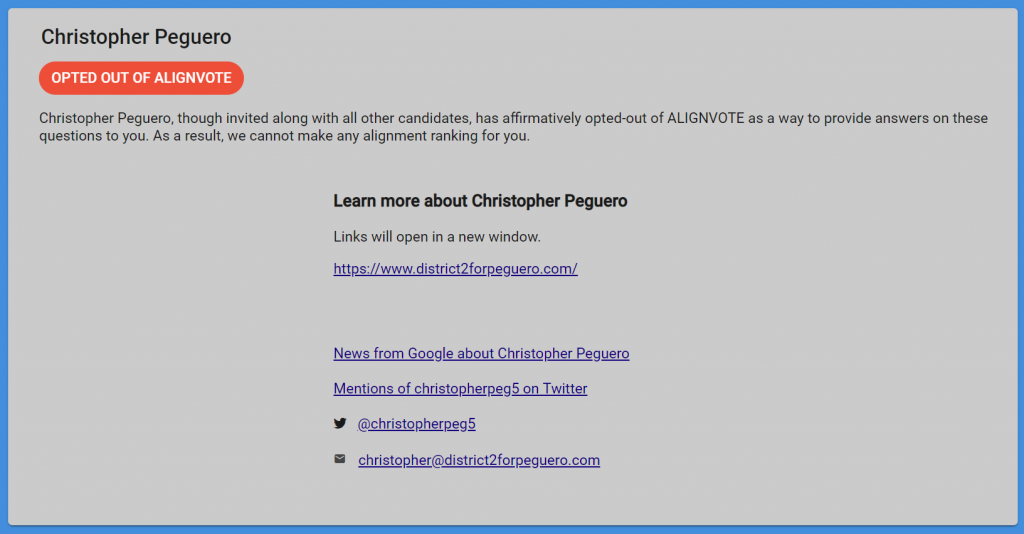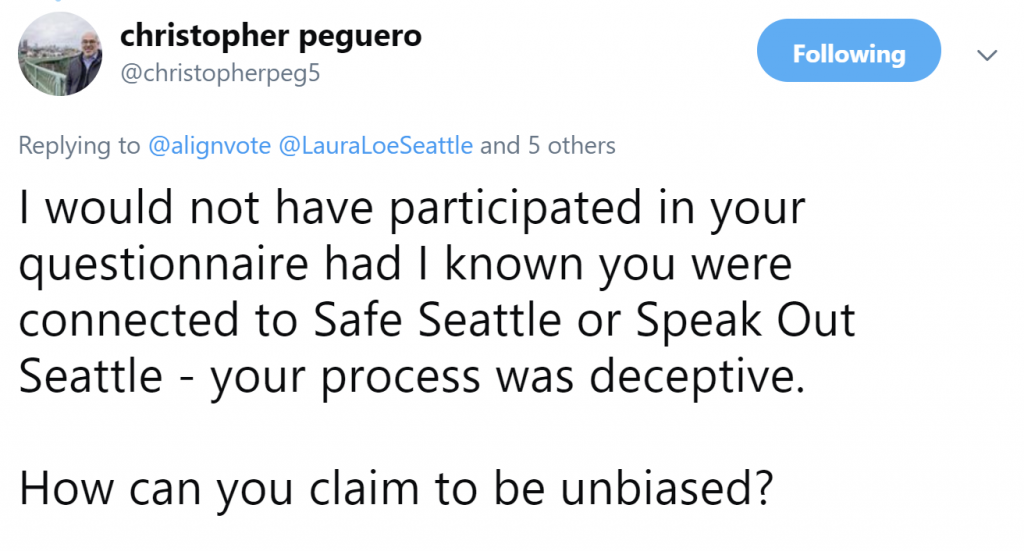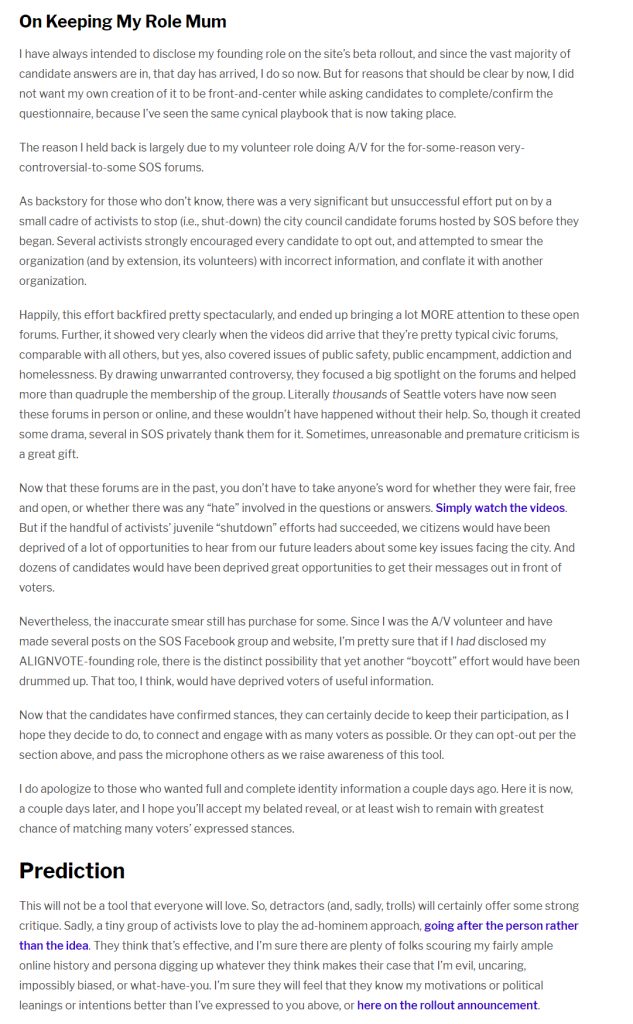Today, I received an official request, via the confirmed Twitter candidate address, from D2 candidate Christopher Peguero to opt out of ALIGNVOTE.
Within an hour, per his request, his listing was changed from stances-known — even though he had previously confirmed all of his stances to voters — to “cleared and unranked” and “opted out.”
Per the outline of the “Want to Opt Out?” section in the introductory blog post, his listing now shows as unranked at the bottom of D2 searches, as follows:

You can see by it taking the Seattle District 2 City Council Race Alignvote Survey, even if you’re not a D2 voter.
This opt-out of course means he cannot elaborate via the platform on his stances on the issues, when D2 constituents turn to the site to compare alignment between themselves and the candidates in the race. Nor will he have access to new candidate-facing features as they are improved and released, such as potentially some candidate-facing top-line analytics about broad summaries of voter sentiment in the race.
As explained previously, Alignvote lists all eligible candidates in each race. We do not outright delete listings, because voters and journalists — including but not limited to supporters of his — might be confused as to why a known candidate is not appearing on the list. Thus, we must explain to voters his status as non-participating, or opting-out. His listing shows in all D2 voter searches, including links to his campaign, where voters can learn more.
We don’t think his decision is great for voters, but it’s his to make. And it clearly means he will miss new opportunities to get his message out online. We’ve completed 3,000+ candidate comparisons at this writing, and this will likely grow substantially soon, as Alignvote is being shared a lot, and also about to be on TV. In some districts, CM elections have been decided by dozens of votes.
Why?
Candidate Peguero expressed serious concerns about both (a) my personal volunteer affiliation with Speak Out Seattle, a group whose positions he does not align with, and (b) that I did not clearly disclose who was behind Alignvote when I sent out the questionnaires. He also (c) claimed I’m somehow closely “affiliated” with Safe Seattle, which is patently untrue — I am in no way part of the leadership or editorial team, nor have I posted much of substance (certainly nothing that would remotely be considered hate) on that page.
I have no funding or financial or organizational/entity association, past or present, with Safe Seattle in any way. It’s a page (a highly popular one, with over 10,000 followers) that people can choose to follow or not with a single click. There’s no “membership”; one simply clicks “Follow” or “Unfollow.” Moreover, I’ve also written here, on this blog, that I don’t always find their voice helpful to the city dialogue, and that I wish they’d retract some articles. Occasionally they do break news. And yes, Safe Seattle has, entirely on their own, posted a link to a blog of mine about the accuracy of self-reported data. But as it’s on the web, it’s freely available for all to read, link and share. I wasn’t contacted by the Safe Seattle editors about this article’s sharing to their 10,000+ readership, and only noticed it after it had gone live since the traffic went through the roof.
Since I fully stand behind what my blog post said, and even the author of the Crosscut piece to which I responded ended up agreeing with my central points, I’m happy to have it shared.
On Keeping My Role Mum for Five Days
I reiterate my apology for keeping the information on who is behind this platform opaque during the 5-day questionnaire rollout-to-candidates phase. I have earlier on this blog (screenshot below) explained the rationale for doing so.
I’m honestly not sure at this point if I’d do it differently, or if this candidate’s very decision in fact validates my decision. Of course, it cannot be done in future uses of Alignvote, and while this platform begins with the Seattle City Council Primary of 2019 as its main beta-test, it has broad applicability to other races around the country, with which I have essentially zero relevant affiliations or involvements, unless we are to say that being a federal taxpayer is somehow disqualifying.
While that opacity is certainly a legitimate concern during the five-day survey gathering phase before we went live with voters (and I announced my own affiliation quite clearly on that day), it’s rather ironic that we now have an opt-out because I had what I felt were reasonable concerns about this very opt-out happening, which at its core springs from a cynical and false disinformation campaign.
While he and I may look at some issues differently, as human beings do, I don’t think there’s much question that his decision deprives voters of valuable (and frankly already on-the-record, just not as easily discover-able) insight about his stances.
Importantly, these opt-outs and “de-platforming” attempts spring from a deeply dishonest and cynical disinformation campaign. It relies upon dishonestly conflating two entirely separate groups, which have different (a) leaders, (b) causes, (c) approaches, (d) media, (e) goals, (f) civility of discussion and (g) perspectives. They have similar sounding names, and they both are engaged in discussion about homelessness, public safety and addiction in the Emerald City, but they are very different in (1) what they are trying to accomplish, (2) how they are trying to accomplish it, (3) who leads each group, (4) how they discuss issues, and (5) what kinds of discussion are fair-game.
But the good news is that you don’t have to take my word for it, and you don’t have to take the tiny group of detractors’ word for it. Speak Out Seattle is a publicly viewable Facebook group. You don’t have to join; simply click on that link, and go explore what kind of discussion takes place there.
Go ahead. I’ll wait.
And then, if you’d like, go to the major volunteer effort I was involved in for the group: the free and open City Council Forums which were held in all seven districts. 70%+ of the questions came from the audience. Go check those out — you can jump right to the Q&A with handy links, because I took a Saturday when I could be doing other things, and hand-indexed them all. But they’re pretty much as you’d expect a civic forum to be. No doubt there are controversial issues, but I challenge you to find the “hate.” This particular candidate also boycotted these forums, presumably for the same reasons. And let’s remember for a moment that he’s running to represent all constituents of D2.
As you’ve no doubt seen, the discussion in the SOS group is generally of the form of concern (yes, sometimes urgent concern), a search for what is working (or not) in other regions of the country, yes, expressions of frustration when things don’t work well for communities and people experiencing homelessness or addiction or other crises (is that off limits for some reason?), what evidence suggests might be the best approach, and more.
SOS’s general policy stances include being in favor of a regional approach (unified at the county level) to homelessness. It backs many of the recommendations from the report we taxpayers paid $200,000 to several years ago — including better coordination of services. SOS is at the moment opposed to taxpayer-funded (mobile van based) Safe Injection Sites as is currently being pushed by some Council Members. SOS is in favor of permanent shelter and permanent supportive housing over tiny villages, opposed to overly permissive approaches on encampment on parks and public greenspace, in favor of dramatic improvement to our systemic failures around frequent offenders, strongly in favor of treatment on demand, electing more effective leaders, and greater investment in wraparound services once that can be established.
In SOS, there are members who have been homeless and some who are currently homeless. 2,500+ strong and growing, there are Speak Out Seattle members who have suffered from addiction and have been incarcerated. There are community members and neighbors. There are public service workers and volunteers. There are people of all races, genders, and religions. There are members who volunteer at food banks, recovery centers and shelters. There are members who are first-responders. There are doctors and nurses and mental health professionals. There are journalists. Discussion is heavily moderated, and kept as civil as you’ll find it anywhere on the web about such difficult, urgent and controversial topics. [I invite you to consider joining more than 2,500 members who are concerned about finding better approaches to the way that we are tackling (or not) homelessness, public safety and addiction.]
Yes, I’ve volunteered for Speak Out Seattle.
I am in fact the reason that you, and all other voters in Seattle can watch the City Council forums held in all districts on YouTube. That’s because I brought my camera equipment, computer, arranged for a good network connection where one was available, attended and livestreamed all seven district council forums, tore it down, made sure it was indexed for all to see. Yes, I suppose I “funded” that too; that is, a couple of pieces of equipment were necessary to do so, so I bought them, and used them pro-bono. (You’re welcome, Seattle.) Happy to do so, for all the voters and candidates and reporters and civic leaders who found them valuable! Because I believe in a more informed electorate, regardless of where we stand on the issues.
Thus far, these forums have had thousands of views. Candidates, with rare exception, have been very appreciative of these opportunities to meet with voters, hear their concerns, and outline their perspectives.) Yet had this tiny group of activists had their way, no one would be able to view them, and candidates would have missed out on a major opportunity to get in front of voters all across the city.
These events were the target of a deeply dishonest (and ultimately spectacularly backfiring) disinformation campaign that attempted to get candidates to opt-out. A couple, including candidate Christopher Peguero, did indeed opt out. They were invited, but chose not to participate. Most of those who did not participate have expressed online that SOS is some kind of “satellite” of Safe Seattle, and believe that SOS should be “deplatformed.” I vehemently disagree on both counts. And I think it’s time citizens push back on this illiberal behavior about what issues can and cannot be discussed, if we want to return civil dialog to the scene.
So, that’s why, in the five day period between when questionnaires were emailed to candidates and the public beta announcement, I kept my own personal identity opaque. I did so deliberately, in part because of those concerns about the dishonest “deplatforming” campaign.
Transparent Since Beta Announcement
On and since the voter-facing announcement of Alignvote, I’ve made my associations with volunteer groups, charitable causes and small donations extremely clear. Links to much more about me, why I’m doing this, and the platform are clearly linked-to at the top of the “About” page of Alignvote.com. See “Hi, I’m Steve.”
There is no bias baked into the platform, and math is applied the same to all candidates and all questions. Candidates can confirm that when they self-interview, they come out #1 or tied for #1 (if another candidate aligns fully with them on these questions.)
I do not have to be doing this project to help bring a transparent tool to voters, but I am. I care about getting more people of ALL political beliefs to participate in elections and an open exchange of (and understanding of) ideas. I know that I’d prefer a tool that would let me find candidates that most closely align with how I’d answer questions, and many people have already commented upon how useful the tool is in their search. (It shouldn’t begin and end with this tool; it’s just one of many.)
Twitter Back and Forth
Candidate Peguero shares his concern about why he’s opted-out in his Twitter thread, which you can go check out at @christopherpeg5 on Twitter:

My response
I do not claim to be unbiased.
I am human, just as Candidate Peguero is. I have perspectives on what might work best as a set of policy approaches for our city, as does he. And I vote. I am not a robot. This platform was created by a human.
But I do claim that while Alignvote has shortcomings and should never be the sole tool one relies upon (which political evaluation tool should be?), it is equitable to all candidates, and many voters have already said it’s a useful comparison tool for them. It’s not the only tool, nor should it be, but it’s one tool that can be used.
As for equitability, this includes, but is not limited to:
- No favoritism is given to any one, or any subset of candidates.
- All candidates have full access to their own dashboard.
- All candidates have been invited, some repeatedly nudged. No filtering is done of what any candidate says.
- No changes to stances are made.
- No editing is done to what any candidate says.
- No math matching formula is applied for one candidate which is different for any other candidate.
- All candidates can and should confirm that they rank #1 for any voter test where they pretend to be a voter who has precisely the same stances.
The Alignvote platform is equitable to all candidates, and very simply measures distance between the views that you, the voter express, and the views that the candidates have on the questions provided. It also allows candidates to elaborate upon their answers if they so choose.
You, the voter, answer precisely the same questions candidates do (either directly or in public venues when inferred), and the platform measures your level of “similarity” in those answers. If the candidates want to elaborate on why they’ve chosen the option, they have been empowered to do so via their dashboard, and those elaborations go live the moment they hit the submit button. The platform indicates whether those candidates who have elaborated AGREE or DISAGREE with the voter’s current stance. It’s pretty simple, and it’s designed to be pretty simple. It does have shortcomings and some of those will be erased over time. But in the meantime, find me the political evaluation tool which is perfect.
As I predicted in the launch of this site, some will not be enamored with this transparency tool for voters, especially as it grows in usage and attention, as it definitely will between now and election day.
Candidate Peguero’s central stated concern is the fact that I did, in fact, hide my identity during the survey-collection phase. He is right to call me out on that — it’s true. I explained pretty clearly why I did so, and I apologize to those candidates who feel that decision was deceptive. But I do find it rather ironic now that the reason being cited for the opt-out was that I was concerned about opt-outs, because I had very legitimate concerns about a limited but vocal minority encouraging opt-outs, which would deprive voters of an easy way to understand candidate stances. In the end, these aren’t candidates providing answers to me. They’re providing them to you, the voter, who is evaluating candidates.
I will leave it to you, Dear Reader and Voter, to consider the question of whether the time has come to factor this kind of “deplatforming” effort into your vote, whether you should take a moment to speak up about it, and whether this kind of cynical “deplatforming” helps or hurts informed choice.
If a candidate’s participation in this voter-transparency tool impacts your vote in any way, you should say so.
As I explained in the launch of this site:

On Speak Out Seattle vs. Safe Seattle
SOS is a group that was formed by four women in Ballard who became concerned about the public encampment regulation that Council Member Mike O’Brien was pushing forward in City Council. These smart and compassionate founders came together to push back on that, because they felt that letting people encamp in city parks was not best for either the individuals involved or the larger community. Their work expanded to the repeal of the Head Tax. And then, the most visible work of the group has been to host City Council Forums in each of the 7 Districts. (Candidate Peguero was invited, but chose not to participate.) Speak Out Seattle is a Facebook group over 2,500 members strong, and encourages civil dialogue on the urgent issues at the intersection of Homelessness, Addiction and Public Safety. Members commit to a civil exchange of ideas, evidence-based discussion, and essentially, a no-trolling policy.
“To date, Speak Out Seattle likely does more than any other org in Seattle to help voters get to know the more than 50 plus candidates running for city council and vice versa. That’s what the SOS bashers just don’t get.” — Nate Chaffetz, Everybody Hates Nate
Safe Seattle, on the other hand, is a snarky, often (in my view) mean-spirited Facebook page that people can either follow or un-follow in a single click. I do not always consider it helpful to the city dialogue and there are some stories that I wish they’d retract. I have no more association with Safe Seattle than does anyone who “follows” someone on Twitter. A Facebook “follow” is something one either does or doesn’t do. I welcome any detractor to find and post screenshots of me saying anything “hateful” about the homeless or other concerns.
If you’d like to hear directly from one of the founders of Speak Out Seattle about the clear distinction between these groups, please read this post. The other co-chair, by the way, was an alternate delegate for the Bernie Sanders presidential campaign of 2016. So it’s rather hard to make a factual case that this group is a bunch of alt-right folks, as a small but vocal group of critics have been disingenously doing.
It turns out real citizens of Seattle do have legitimate concerns about matters of addiction, public safety, public encampment and more. They were front-and-center in the audience questions at the Speak Out Seattle forums. I am a human, and I do have concerns about these issues, guilty as charged.
Alignvote doesn’t care about these issues, because it simply mathematically and equitably calculates similarity between YOUR and CANDIDATE answers to the SAME questions.
Alignvote’s Opt-Out Policy
It’s a beta, and our opt-out policy isn’t fully established yet.
We expect, with upcoming TV coverage (likely next week), and the viral nature of the site — because there are so few tools at voters’ disposal for this kind of clear comparative information — that Alignvote will surpass 100,000 voter “candidate rankings” by election day, August 6th 2019. That obviously provides a tremendous incentive to candidates not just to participate and have their stances and messages to voters clear, but it provides equitable-to-all-candidate opportunities to get their message out to voters about why they feel the way they do. Non-participating candidates have no mathematical chance to score in the top ranked search results, because we have no way of calculating if their positions on the issues match those of the voter.
We think this tool helps voters understand where candidates stand, and we of course would love for all candidates to participate. But we certainly will not force candidates who do not wish to participate to participate.
For operational reasons, we do, at a minimum, have a three-week waiting period once a candidate opts-out of the tool to get back on the platform if they want to. That’s because there are currently operational costs to opting out and opting back in, and we do not think an inconsistent experience benefits voters, where someone can be in the platform one moment and out the next. So, to start, we have established a 3-week minimum waiting period, but it may also be a permanent decision once made. We invite this candidate to contact us from his official campaign email address should he wish to rejoin the platform, and offer to re-establish his listing just like anyone else’s.
New Twitter Blocking Policy
Again, as I predicted a few days ago, trolls have surfaced.
While I’m transparent about who I am, they often are not as transparent, and prefer to launch their work from anonymous accounts. Some of the most frequent posters are not even residents of Seattle, and won’t be eligible to vote in this City Council election.
While I am extremely open to thoughtful critique, debate and ideas to make this an even better tool for voters and candidates, I have better things to do than engage in juvenile Twitter trolling wars. The Alignvote platform marches forward, there are many very interesting opportunities to expand it, and there are only so many hours in the day.
So, despite my strong personal distaste for the “block” and “mute” buttons, when things drift into bad-faith discussion or false innuendo or rehashing questions clearly known to have been asked and answered, I will be blocking, both from @alignvote and my personal account, @stevemur.
Good-faith discussion is a two-way affair; it’s not unidirectional.
What You Can Do
Do you support what we’re trying to do here? Could use a word of support on Twitter.
If candidates’ participation level on Alignvote influences your voting decision in any way, it’d be helpful to let candidates know about it.
We’re https://twitter.com/alignvote on Twitter.
Long-planned Break: Platform Freeze Until 1st Week of July
As I’ve mentioned on Twitter and here on this blog over the past several days, I will be going on a long-planned guys’ trip, backpacking for a couple weeks.
This was long-planned, certainly well before the spark that created Alignvote. So I will be mercifully off the grid for a couple weeks. I will be prioritizing candidate emails first when I return, and apologies in advance for slow response. A friend has offered to step in and catalog responses and answer simple questions, but all suggestions will gain a full look in a few weeks.
Hope you too can get out to the great outdoors this summer or fall, and see you in July!
Summer Reading
I invite people to read this excellent book by noted liberal commentator Kirsten Powers:

